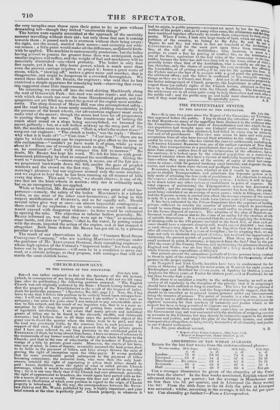THE PENITENTIARY SYSTEM.
TO THE EDITOR or THE SPECTATOR.
SE1Z—It is now two years since the Report of the Committee on Transport.. tion appeared before the public. I beg to direct the attention of your readers to that Report—to many of the appalling ducts disclosed in the evidence before the Committee—to the horrid state of demoralization and vice which the coo, viet population had brought upon our Colonial settlements ; while it proved
that Transportation, as then conducted, had failed in every way to attain the
real end of all punishment. This view now seems to have net with general acceptation from all who have turned their attention to the subject. It is re. corded by every traveller W110 Inns visited the convict settlements, including the well-known GEORGE BARRINCTON, one of the earliest convicts of New South Wales, that transportation as a punishment does not produce sufficient fear to deter from crime ; neither does it aid the reformation of the offenders; but on the contrary, it is looked upon by the criminal population as a removal for • favoured country where they have is chance of materially improving their con& tion—where they may partake of the society of many of their lost coma. aliens in crime ; while its general tendency must brutalize and degrade the cha- racter, and render them more vicious and profligate than before. It remains, however, to be seen, whether or not it would be more adroit. pools to abolish Transportation, and substitute the Separate system as the only mode of attaining the true ends of punishment. An objection is raised to the expense which attends the Penitentiary system : I believe it will be found to be much below any other system of punishment in point of expense. The total expense of maintaining the Transportation system has amounted to 8,000,0(10!.; and the average expense of each convict has been 811., the punish. meat being calculated on an average of seven years ; while at Glasgow, where I find the Separate system is carried into effect, the average expense of the convict is only 51. a year, or 35/. for the whole term (seven years) of imprisonment, It has been estimated by the Prison-Inspectors that the expenses of building prisons sufficient to contain the number of convicts subject to punishment, would be something under 2,000,0001.,—a small outlay to attain the great end for the future disposal of convicts. The adoption of the plan of Separate con• tinement would of course also be the cause of an outlay ffir the erection of cells of' suitable dimensions. It is estimated that the cost of supplying the deficiency of sleeping-cells in the 136 prisons included in the Goat Act, so that each pri- soner should have a separate sleeping-cell, would exeoed NO,0001 ; • but, heavy as such charges nay appear, it mita not be forgotten that tine beat economy after all consists in the best system of discipline ; for by adopting that, we may hope not only to diminish the extent of crime, but to afford the opportunity of shortening the present periods of punishment. That these are objects of no small moment in point of economy, is apparent from the fact,* flint in the year 1834 the costs of the County Prisons, and maintaining the prisoners therein, in
England and Wales, was no less Own ; bring nearly a third of the whole County-rate expenditure of 6(.13,74'7/. Our prisons present the anomalous spectacle of insane persons being confined in them in spite of the existing laws intended to provide tor theaustody of such persons in the proper asylum.
At Newoute •I• and York Castle, lunatics have been in confinement for five years, at Irchester and Morpeth for seven years, at Warwick for eight years, at Buel:ingliain end Hereford for eleven years, at Appleby for thirteen years, at Anglesea for fifteen years, at Exeter for sixteen years, and at Pembroke for not less than twenty-four years. This abuse is so manifest a cruelty to the unhappy lunatic, as well as sub- versive of all regularity in tine discipline of the prisons, t hat it is surprising it should have been suffered so long to continue. The Laws for the regulation of lunatics appear to be defective ; and the Inspectors properly suggest, that they should be so remedied as to prevent 109:U10 persons, under any circumstances, being the inmates of prisons. The point of insanity is a nice one, it is true; but surely not so difficult as to be incapable of determination, or to occasion the slightest necessity for that mockery of humanity and justice which in this respect has been so long permitted to disgrace our prisons. I cannot conclude these remarks without expressing an anxious wish that the Government may not rest contented with the abolition of assigning convicts as servants in the Colonies, but may shortly lie induced to appeal to the dictates of reason and justice, and adopt the plan of the Separate system, and abolish transportation altogether, as being totally destructive of all morality and justice, in our Colonial settlements.
* Report °Coke Commissioners. 16th June t Relied or Inspectors. lime District, p.


























 Previous page
Previous page